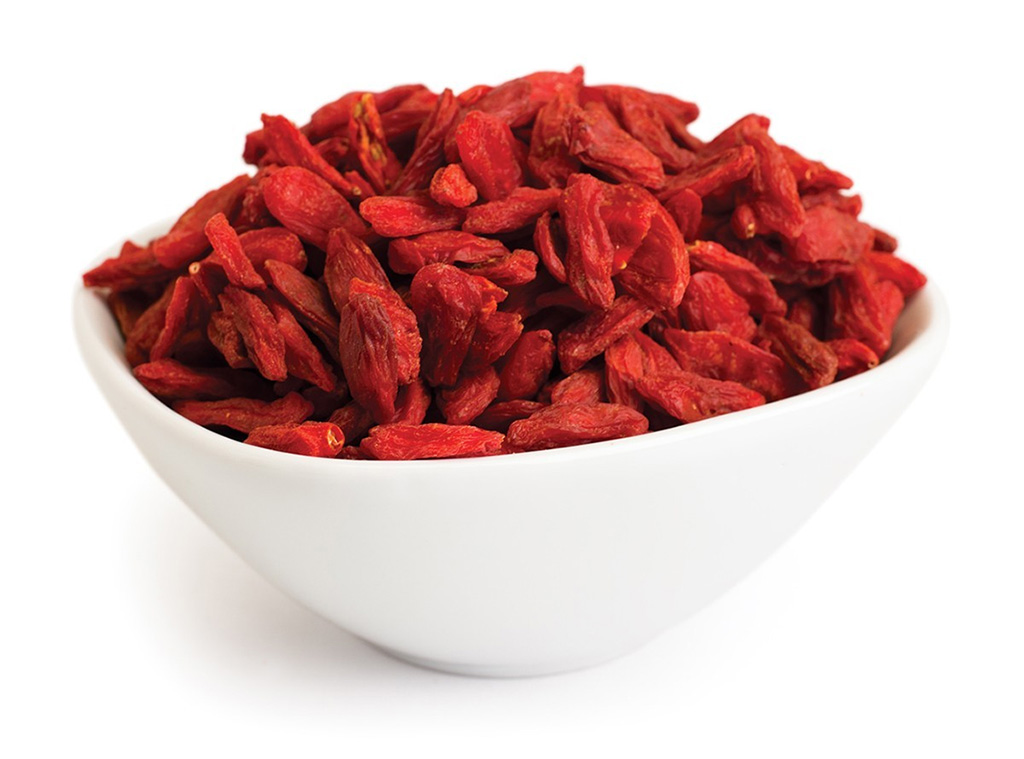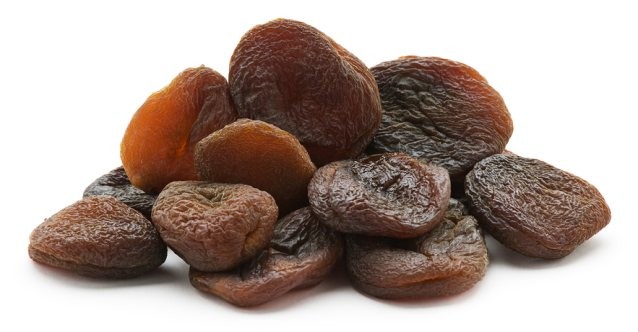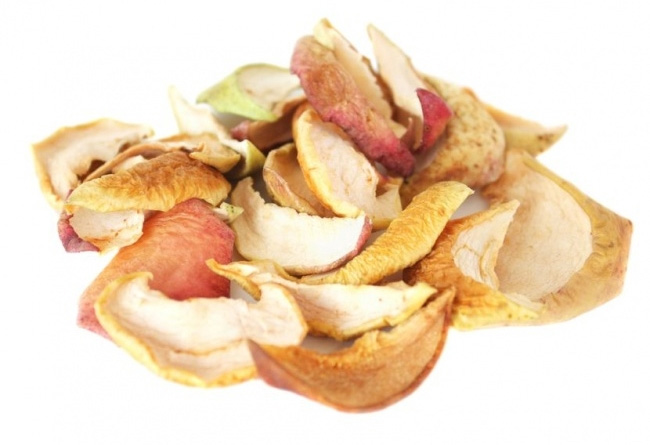DRIED FRUIT
Concentrated food products with very low water content. They are rich in simple sugars - glucose and fructose, so they are high-calorie. They contain vital nutrients. Modern technologies for natural drying not only preserve the vitamins and minerals in the dried fruit, but also they are even with higher concentrations of these substances.
 Origin: Bulgaria
Origin: Bulgaria
 Plums are rich in proteins, carbohydrates, fiber, organic free acids, potassium, calcium, sodium, phosphorus, magnesium, chromium, zinc, iodine, manganese, copper, fluorine, provitamin A, vitamins B1, B2, B6, PP, C , E.
Plums are rich in proteins, carbohydrates, fiber, organic free acids, potassium, calcium, sodium, phosphorus, magnesium, chromium, zinc, iodine, manganese, copper, fluorine, provitamin A, vitamins B1, B2, B6, PP, C , E.
Dried plums fully retain their healthy substances composition which is the same as in fresh fruit. They are richer in sugars and organic acids. One of the best sources of rutin, the so called vitamin P.
Plums help the body get rid of "bad" cholesterol. They are a healthy food with less calories.
Nutritional value:
| Nutrition facts | for 100 g. |
| Energy | 240 Kcal |
| 1004 kJ | |
| Fats, | 0 g |
| of which saturates | 0 g |
| Carbohydrate, | 64 g |
| of which sugars | 38 g |
| Protein | 2 g |
| Fibres | 8 g |
| Sodium | 0.002 g |
Plums are contained in following NICS varieties:
 Origin: Turkey
Origin: Turkey
 Drying of grapes while it turns into raisins has been done from ancient times.
Drying of grapes while it turns into raisins has been done from ancient times.
Raisins are a rich source of carbohydrates, 94% of which are glucose and fructose - harmless sugars for diabetics. Raisins contain vitamins C, P, PP, B1 and B2, carotene, potassium, calcium, phosphorus, magnesium, manganese, selenium, organic acids.
Raisins are a major source of micromineral boron, which helps to strengthen our bones.
They contain antioxidants and especially oleanolova acid. They are rich in iron.
Regular consumption of raisins helps to combat fatigue and depression.
Nutritional value:
| Nutrition facts | for 100 g. |
| Energy | 292 Kcal |
| 1223 kJ | |
| Fats, | 0.4 g |
| of which saturates | 0.15 g |
| Carbohydrate, | 69.4 g |
| of which sugars | 59.5 g |
| Protein | 2.7 g |
| Fibres | 2 g |
| Sodium | 0.077 g |
Raisins are contained in the following varieties of NICS:
 Origin: Bulgaria
Origin: Bulgaria

Ancient Romans had a custom to give cherries only to the highest-ranking guests. Red fruit of spring supplies us with us with vitamins and micro-elements we need and that's why is loved worldwide.
Cherries are rich in flavonoids and in anthocyanins which are of great importance for immunity. They contain quercetin - a strong anti-inflammatory pain reliever. Sweet fruits derive toxins and enrich with iron when there is anemia. Often eaten they reduce weight,cholesterol and high blood pressure.
Cherries are a rich natural source of ellagic acid, which has anti-cancer properties and of vitamin C, provitamin A, B vitamins, vitamin P, iron, potassium, sodium, magnesium, calcium and phosphorus. They activate the metabolic processes, improve appetite and brain function and have overall and strengthening effects on the body.
Nutritional value:
| Nutrition facts | for 100 g. |
| Energy | 350 Kcal |
| 1464 kJ | |
| Fats, | 0 g |
| of which saturates | 0 g |
| Carbohydrate, | 83 g |
| of which sugars | 45 g |
| Protein | 3 g |
| Fibres | 25 g |
| Sodium | 0.015 g |
Cherries are contained in the following types of NICS:
 Origin: Greece
Origin: Greece
 Blackcurrant is also known as French black grapes.
Blackcurrant is also known as French black grapes.
The fruits are characterized by high biological value because of the high content of sugars, organic acids and pectin.
The black little fruits contain a large amount of vitamins A, B and C, as well as potassium, magnesium, iron, phosphorus, zinc, and even calcium.
These fruits contain up to three times more vitamin C than oranges. The blackcurrant berries are also rich in essential fatty acids, and tannin, potassium salts and essential oil. Pectin contained in blackcurrant helps in discharging of certain harmful substances accumulated in the body.
Nutritional value:
| Nutrition facts | for 100 g. |
| Energy | 367 Kcal |
| 1536 kJ | |
| Fats, | 3 g |
| of which saturates | 0 g |
| Carbohydrate, | 80 g |
| of which sugars | 63 g |
| Protein | 0 g |
| Fibres | 13 g |
| Sodium | 0 g |
Cassis is contained in the following types of NICS:
 Origin: Bulgaria
Origin: Bulgaria

Aronia is simply a natural gift! The fruits of this bush are one of most powerful antioxidants in nature. Russian scientists even include it in the composition of space food.
The fruits of aronia are characterized by great quantity of vitamins and minerals, which ranks them in the list of valuable medicinal plants. The fruit contains sugars - fructose and glucose predominate, making it suitable for diabetics. It contains a wide variety of amino acids.
Aronia is a powerful immunostimulant.
Most valuable in the content of aronia berries are essential polyphenolic compounds, also called rutin or vitamin P. There is no other plant with such record polyphenol content (P active) substances. Unique is that it contains flavonols, catechins and anthocyanins with strong antioxidant and anti-inflammatories action.
From macronutrients in aronia contained are potassium, calcium, phosphorus, magnesium, iron and other trace elements and - a record amount of iodine, manganese, molybdenum.
Exclusively important characteristic of aronia is the high content of all essential vitamins, which enhances their biological activity.
Nutritional value:
| Nutrition facts | for 100 g. |
| Energy | 325 Kcal |
| 1360 kJ | |
| Fats, | 0 g |
| of which saturates | 0 g |
| Carbohydrate, | 66 g |
| of which sugars | 27.2 g |
| Protein | 3.6 g |
| Fibres | 7 g |
| Sodium | 0 g |
Aronia is contained in the following types of NICS:
 Origin: China
Origin: China
 Goji Berry is known in Bulgaria as wolfberry and lycium berries. The fruit originates from the Tibetan Himalayas and northern China, where they are called "red diamonds" because of their beneficial characteristics.
Goji Berry is known in Bulgaria as wolfberry and lycium berries. The fruit originates from the Tibetan Himalayas and northern China, where they are called "red diamonds" because of their beneficial characteristics.
In the chemical composition of goji are included 18 essential amino acids, as well as a number of vital micro elements - phosphorus, zinc, calcium, iron, copper, potassium, magnesium, sodium and selenium. In terms of vitamins, goji berry combines vitamins B1, B2, B6, A, E, C.
According to recent studies, the quantities of Vitamin C
in lycium are approximately 500 times more than in oranges. All this makes goji berry literally a bomb of vitamins, minerals and antioxidants.
One of the most characteristic features of this fruit are regulation and improvement of immune system, greatly slowing the tissues aging process.
Goji berry is a good adaptogen, i.e. has a general therapeutic effect on the human body, strengthens the body and helps it deal better with stressful conditions.
Nutritional value:
| Nutrition facts | for 100 g. |
| Energy | 243 Kcal |
| 1017 kJ | |
| Fats, | 0.32 g |
| of which saturates | 0.05 g |
| Carbohydrate, | 66 g |
| of which sugars | 57 g |
| Protein | 0.9 g |
| Fibres | 8.7 g |
| Sodium | 0.087 g |
Goji berry is contained in following NICS varieties:
 Origin: Turkey
Origin: Turkey
 The natural apricot in NICS ingredients has not been treated with sulfur dioxide or other sulfites.
The natural apricot in NICS ingredients has not been treated with sulfur dioxide or other sulfites.
This fruit is rich in antioxidants, vitamins B2, B3, B5, C, A, fiber, potassium, zinc. Dried apricots are an excellent source of iron and calcium. The presence of pectin in combination with the organic acids in their ingredients, frees the body of radionuclides and heavy metals.
Just a few apricots per day supply us with the necessary dose of beta carotene - a powerful antioxidant that our body transforms into Vitamin A. Contained therein vitamin E improves blood circulation. Magnesium and phosphorus in apricots contribute to the active work of brain. Apricots improve immunity.
Because of their beneficial characteristics apricots have been number one in the list of provisions of NASA astronauts.
Nutritional value:
| Nutrition facts | for 100 g. |
| Energy | 241 Kcal |
| 1007 kJ | |
| Fats, | 1 g |
| of which saturates | 0 g |
| Carbohydrate, | 63 g |
| of which sugars | 53 g |
| Protein | 3.7 g |
| Fibres | 8 g |
| Sodium | 0.01g |
Natural apricots are contained in the following varieties of NICS:
 Origin: Bulgaria
Origin: Bulgaria
 The fruit which is the reason Isaac Newton to discover the physical law of universal gravitation. It is preferred around the world for its numerous health benefits. Apple is an effectively cleansing agent that helps in body detoxification, especially because it contains pectin.
The fruit which is the reason Isaac Newton to discover the physical law of universal gravitation. It is preferred around the world for its numerous health benefits. Apple is an effectively cleansing agent that helps in body detoxification, especially because it contains pectin.
"Queen of fruits" also contains vitamin C, B1, B2, P, E, A, potassium, iron, manganese, calcium, lectins, sugars, organic acids. There are a large number of microelements in them - potassium, phosphorus, magnesium, sodium, sulfur, aluminum, boron, vanadium, iron, iodine, copper, molybdenum, nickel, fluorine, chromium, and zinc.
Apples are with good nutritional properties and are used as a dietary product for eating disorders, vitamin deficiency, anemia and as a diuretic.
The biblical fruit has a good restorative effect and increases the body's resistance. Apple is a fruit with a very low glycemic index.
Nutritional value:
| Nutrition facts | for 100 g. |
| Energy | 243 Kcal |
| 1017 kJ | |
| Fats, | 0.32 g |
| of which saturates | 0.05 g |
| Carbohydrate, | 66 g |
| of which sugars | 57 g |
| Protein | 0.9 g |
| Fibres | 8.7 g |
| Sodium | 0.087 g |
Apple is contained in following NICS varieties:
 Origin: USA
Origin: USA

Research found that blueberries rank first for their antioxidant activity among 40 other fruits and vegetables.
These popular fruits are excellent in terms of their health qualities. Blueberries have the highest antioxidant properties. They are rich in vitamins A, B1, B2, C, E, K, potassium, sodium, calcium, magnesium, phosphorus, iron. They are the absolute leader in terms of manganese content.
Thanks to these substances blueberries help the cardiovascular system, strengthen blood vessels, vision , strengthen the weakening of brain activity and delay aging.
Fruits of blueberries contain also sugars, organic acids (citric, malic, succinic, etc.), tannins, pectin, fibers, glycosides and coloring matter. They have natural antibacterial properties and fight free radicals.
Blueberries enhance immunity and phytoncides in them destroy many types of bacteria. This fruit is rich in pectin which tend to clean the stomach.
Nutritional value:
| Nutrition facts | for 100 g. |
| Energy | 325 Kcal |
| 1358 kJ | |
| Fats, | 1 g |
| of which saturates | 0 g |
| Carbohydrate, | 80 g |
| of which sugars | 75 g |
| Protein | 3 g |
| Fibres | 3 g |
| Sodium | 0.025 g |
Blueberries are contained in the following types of NICS:
 Origin: USA
Origin: USA
 Cranberries were the first thing that impressed the English settlers in America in the XVII century. They discovered very quickly the healing properties of this fruit, which is known today among the best sources of vitamine C.
Cranberries were the first thing that impressed the English settlers in America in the XVII century. They discovered very quickly the healing properties of this fruit, which is known today among the best sources of vitamine C.
Cranberries are a good vegetable source of omega3 fatty acids: particularly important for the metabolism. These red fruits are rich in micro elements, minerals, tannins and flavonoids, essential fatty acids - linoleic acid (omega-6), alpha linoleic acid (omega-3), carotenoids and phytosterols. This kind of cranberries are one of the biggest and absolutely natural sources of vitamin C but also contain high quantities of vitamins A and E.
They are best known for their natural antibacterial and anti-inflammatory properties due to the high content of anthocyanins. They help in lowering cholesterol and protect cells from damage. An additional plus is that the fruit has a low glycemic index.
Nutritional value:
| Nutrition facts | for 100 g. |
| Energy | 308 Kcal |
| 1289 kJ | |
| Fats, | 1.4 g |
| of which saturates | 0.1 g |
| Carbohydrate, | 82 g |
| of which sugars | 65 g |
| Protein | 0.07 g |
| Fibres | 5.7 g |
| Sodium | 0.003 g |
Cranberries are contained in following NICS varieties:















